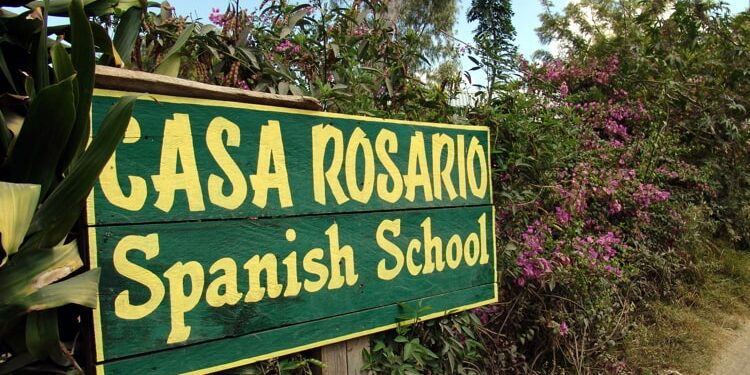Does moving overseas mean having to learn a new language?
Well, unless you choose to move to one of the few countries worldwide where the language is English (Ireland, Belize, or New Zealand, for example)… I’d say yes.
Living in a place where the people communicate in a language other than English, I’d say you need to be prepared to make the effort to learn at least a little of that new language.
I’m planning a move to a Spanish-speaking country. I’m not quite sure which country yet… but I’ve narrowed down my list… and in every country on it, the folks speak Spanish.
So I figure I should, too.
How Best To Learn?
I decided to try total immersion and recently finished the last week of an eight-week program at a Spanish-language school in Antigua, Guatemala…
It was an amazing experience.
If you decide to go this route, too, expect much more than a language-learning experience. Expect to learn about the richness and the challenges of a new culture. Expect to fall in love with people you meet.
And, if you grew up a Baby Boomer, expect to develop an appreciation for how modern technology has made the whole process of traveling and communicating across our globe so much easier.
Having just completed my eight-week immersion program, here’s what else I can tell you:
Yes, you will be able to communicate using your new language.
You won’t be fluent, but you will be able to do a lot more than ask for directions to the beach.
And you’ll enjoy other benefits that could well change your life forever.
I am more convinced than ever that living in another country is not only possible at any age but desirable and truly a great adventure.
My Experience In The Immersion Program
I studied with a teacher, one-on-one, four hours a day, five days a week. We talked for three of those hours in Spanish about almost anything—our lives, our plans, you name it.
We told jokes (mostly I did). Old jokes in a new language become fresh and really funny again.
My grammar isn’t perfect, and sometimes I struggle for how to approach a sentence, but, bottom line, communication is not a problem. I could now live in any Spanish-speaking country and get by fine, make friends, etc.
Wherever I end up, I will read, study, and likely take more lessons, but this program was a great start.
Now… I’m 70-something years old. Was it as easy for me to learn as it would be for a 10-year-old?
Sorry, no, it was not.
One of my fellow students was a Harvard grad neurologist. He says kids have plastic brains especially equipped for learning language. Someone my age doesn’t.
OK, doc, no argument here.
If you’re up there in age like me, don’t despair. Believe me. It will be well worth your time and effort. The additional benefits can be extraordinary.
My teacher and I (she is a college graduate in language) became best friends.
When you talk for hours every day for eight weeks straight, you come to know a person well. And by extension you come to know that person’s culture and customs and all the “do these things and do not do those things” that come in very handy. The cultural education is worth the price and time all by itself.
Each day, my teacher and I sat outside in a lovely jardin (garden), under an umbrella (the birds are not housetrained), at a small desk with two facing chairs. We did formal training, I had lots of tarea (homework), I conjugated, I wrote frases (sentences), and we told stories to each other.
The biggest benefit for me? Being able to talk to these people and then falling in love with them. I lived with a Guatemalan family. Theirs is a big house, with three generations (two grown daughters, a son, a son-in-law and two nietos (grandchildren) under roof… plus a full-time cook and up to five students.
The father of the house was ill and in the hospital when I arrived and died soon after. I watched and became a participant in the grieving process. These are strong families, with deep love for each other. The whole community grieved. The funeral, the procession, the traditions… it was something very special to be part of.
These people are strong, and they work very hard.
Our cook fell and broke her arm. It was put in a cast, and she was back to work that afternoon with her usual big smile and great sense of humor. My salsa teacher (yes, I studied salsa, too… don’t ask), I learned, has overcome incredibly difficult obstacles in life yet remains an energetic, passionate, kind, and patient person.
Through it all we (me and my adopted family, teachers, etc.) learned how wonderful it is to discover our common humanity. We just need to be able to communicate.
And now, for me, communication is so much easier.
Plus, remember, in the real world you have those two marvelous inventions to help you—the smartphone and the internet.
Google Translate, Spanish Dictionary, electronic maps with directions in different languages, WhatsApp, Skype, SIM cards, Google Maps, and on and on…
Smartphones and the internet have changed travel and relocation forever. It is so much easier to communicate, to find a restaurant or a hotel, to speak with the in-laws back home, to find out when the local soccer team is playing… to do anything you want to do anywhere in the world.
It is truly amazing. I don’t know another word for it.
So, as you might have guessed by now, I enjoyed this adventure. Indeed, I did.
You will, too. Just go do it.
Study a language, and you’ll learn so much more. I predict it will be the beginning of your Great Adventure.
Doug Rosecrans










